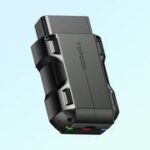For car owners and DIY mechanics, understanding what’s happening under the hood is becoming increasingly crucial. Modern vehicles are complex machines, and when that check engine light illuminates, it can feel like deciphering a cryptic message. This is where OBD scanners step in, acting as a vital communication tool with your car’s computer. You might be wondering, “Do I really need to spend a fortune on an OBD scanner?” The good news is, you don’t have to. This guide dives into the world of Cheap Obd Scanner Reviews, exploring if these budget-friendly devices are worth your investment and how they can save you time and money.
Why Consider a Cheap OBD Scanner?
The primary benefit of any OBD scanner, including the cheaper models, is its ability to quickly diagnose car problems. Imagine facing a mysterious issue with your vehicle. Without an OBD scanner, your next step would likely be a trip to the local garage. While professional mechanics are invaluable, diagnostic fees can add up quickly. Independent garages often charge around £50 per hour for labor, and just identifying the fault code can incur this cost. A cheap OBD scanner can often pay for itself in a single use by allowing you to read these fault codes yourself.
Pairing a cheap OBD fault code reader with resources like Haynes AutoFix empowers you to diagnose and potentially fix common car problems and electrical issues right in your driveway, using simple tools. This combination is particularly appealing for those who are comfortable with basic car maintenance and want to avoid unnecessary garage expenses.
What to Expect from Cheap OBD Scanners
The market offers a wide range of OBD scanners, from basic, low-cost options to professional-grade, expensive tools. While high-end scanners boast advanced features, cheap OBD scanners focus on the essentials. Regardless of the price, all OBD scanners should fulfill core functions:
- Vehicle Communication: Establish a connection with your car’s onboard computer system.
- Fault Code Reading: Retrieve diagnostic trouble codes (DTCs) that indicate problems.
- Fault Code Clearing: Erase fault codes and turn off the check engine light (though the underlying issue needs to be resolved).
It’s important to note that cheap OBD scanners typically have limitations. They usually won’t handle advanced functions like resetting service lights for oil changes, ABS, SRS, or other systems. For these more complex resets, you might need a more advanced scanner or to consult resources like Haynes AutoFix for specific procedures.
Search for Haynes AutoFix for my car now
Understanding OBD and OBD2
OBD stands for On-Board Diagnostics. The OBD port in your car is a standardized interface that allows scanners to access vehicle data. It resembles an old-style SCART connector. This 16-pin port has been mandatory in all petrol passenger cars sold since January 1, 2001, and in diesel cars since 2004. Within Europe, it’s known as EOBD, while outside Europe, it’s generally referred to as OBD2.
The OBD socket conveniently provides power to the scanner, eliminating the need for batteries or a separate power source for your cheap OBD scanner. This plug-and-play functionality makes even basic, affordable OBD scanners incredibly user-friendly for quick diagnostics.

